Ssendaula expects to harvest 5,000 bags of maize this season
Gerald Ssendaula, the former Minister of Finance is a renowned commercial farmer in Uganda.
In 1990s, he was Uganda’s best farmer, with over 1,000 heads of cattle and a huge coffee plantation.
However, after joining politics, the farm’s performance was negatively affected as it lacked his physical presence and routine supervision.
None the less, he remains a big commercial farmer with square miles of land in various parts of Buganda. He is looking forward to getting back his farm to its glory days.
Off his busy schedule at the farm, he does work for the government as Presidential Advisor on Financial matters.
Business Focus recently visited Ssendaula, 77, at one of his farms in Kaabagala near Kinoni Trading Centre in Lwengo district to share his success story and lessons farmers can learn from him.
As you approach this farm, your eyes are greeted with a huge plantation of maize that is about to start drying up as well as a number of money-making crops the retired politician and banker is farming.
Apart from maize, Ssendaula grows other perennial crops like tomatoes, cabbages, watermelons, onions, pumpkins, beans and coffee. He is also involved in the business of beef and dairy cows, goats and sheep.
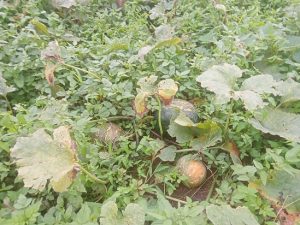
“We have been rotating these crops on this land. That land (pointing at a bushy piece of land) has been left to farrow,” he says, as we walk around the farm.
He planted 20 acres of tomatoes whose harvest is almost complete.
“We want to plant tomatoes on trees like they do in the green house but we are going to do it in the open. This will allow proper spraying. We hope it will make a difference,” he says.
In Kaabagala, Ssendaula has over 1,000 acres of land. One part of his land is located in a wetland – he plans to do fish farming on it.
The other part is occupied by squatters.
Currently, he has about 80 acres of maize on this land. He adds that he has an additional 200 acres of maize in other areas. He therefore expects to harvest a total of about 5,000 bags worth 100kgs each.
“When prices are good, we expect to get some good money,” he says without giving specifics. However, a quick calculation shows he would get a total of 500,000kgs and if each kilogram is sold at an average of Shs1000, he would earn a gross profit of Shs500m.
Based on his experience, he says a farmer can harvest up to 2.5 tonnes per acre a season and make good margins.
“If you have four acres, you are looking at 100 bags. You can break even. What’s important is to satisfy the crop. Today, you can’t succeed in farming without using fertilizers and many farmers don’t make their own fertilizers. Majority have got to buy artificial fertilizers which requires money. You’ve also got to spray against pests,” he says.
In terms of market, Ssendaula sells his produce in Kampala and supplies some fresh produce to some hotels and restaurants on a weekly basis.
Ssendaula reveals that ‘Black Off’ Liquid Organic Fertilizer, a locally developed broad spectrum pest-repellent natural fertilizer has helped him cut on money spent on artificial fertilizers.
“This season I have only used Black Off and you can see our crop (maize) has done well,” he says, adding that he has also used the fertilizer on pumpkins, tomatoes, watermelon and beans.”
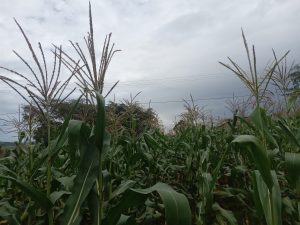
The Agricultural Chemicals Board under the Ministry of Agriculture, Animal Industry and Fisheries (MAAIF) on August 19, 2022, approved the registration of ‘Black Off’ Liquid Organic Fertilizer which is produced by Reticia Products Research.
This was after Government-owned Namalere Agricultural Centre carried out extensive research on the product and found its composition to be NPK 4:14:11+Amino Acids (in technical terms).
Ssendaula, who has an irrigation system in place, grows vegetables throughout the year.
He had cows in Kaabagala but they have since been transferred to Rakai district where he has a bigger chunk of land. In Rakai, he has beef and dairy cows, goats and sheep.
Politics & farming
“Before I meandered into politics,” Ssendaula says, we had cattle here…this was a modern farm.”
He added: “We were milking about 1,000 litres of milk daily. In 1989/90, I was the best farmer in Uganda. In 1991, I was again the best farmer in Uganda,” he says, adding that he has since turned the calf pen into a house for farm workers.
He also has another piece of land in Kyabbogo Village, Kingo Sub-county, Lwengo District, where he mainly grows coffee and bananas on about 60 acres of land. The other land is in Mpigi district.
Jobs & supervision
Asked about how he manages the various farms located in different areas, Ssendaula said that all his farming activities employ about 200 people.
He regularly supervises all his farming activities in different areas to support his employees to deliver on their routine responsibilities.

“When I am not here, I’m at other farms. I am always on the move and I like it. I am hands on and practical. At 77 (years of age), it helps me a great deal,” he says.
Lessons to farmers
Ssendaula was asked about his priceless advice to farmers who want to be successful.
“First of all, let them be farmers,” Ssendaula says, adding: “One leg here, one leg there doesn’t really work; when you get money out of farming, you should first plough it back in farming. Have passion for your farm. Don’t get money and marry a new wife; sometimes when farmers get money, they look at the luxury as a priority yet farming money just like any other business needs to be reinvested to build a strong foundation. A farmer should only diversify or expand after building a strong foundation,” he says.
He adds that when he gets a bumper harvest like the one he expects from his maize, he is unmoved because he has a farm sustainability plan.
“You need to ensure that you’re consistent. You can’t be late in farming; it’s timely. Don’t get into another activity which takes away the money and you find that you don’t have the necessary money at the time when you most need it,” he says, adding that farmers should save so that they’re able to meet farm expenses in case of a bad season or failed crop.
Ssendaula advises farmers not to rush into other crops until they make thorough research on them.
He says farmers should know the size of their land to determine which crops to venture into.
“With intensive farming, you may find your land can allow you to make money in bananas/matooke but not maize,” he says.
He adds that farmers should also seek and accept technical advice because it counts a great deal.
“If you don’t take technical advice, there are chances of you running astray. Things may not work as you expect,” he says.
Storage opportunities
He says all farmers should have a storehouse/granary especially those in cereal farming so that they are not taken for a ride.
“Store the produce when prices are low; don’t rush into the market,” he says, adding that you’ll regret because somebody makes “a kill out of your sweat.” Ssendaula has a huge maize crib and storehouse.
Parish Development Model
Ssendaula says the Parish Development Model (PDM), a government programme that aims to lift Ugandans at a lower level out of poverty, is good because it gives opportunity to increase production at a grass root level.
He however said, the government should be mindful of the whole post-harvest handling which includes storage and marketing.
“Quick money will always be in perennial crops like maize, beans, tomatoes, onions, pumpkins, cabbages, potatoes and other food items which can help someone pay back the loan so that money is rolled over. However, the market is so unstable that you may not get back the money genuinely,” he explains.

He gives an illustration; “If you are given half a million this season, you should recover it and make some profit, then plough it back, that way you can think of fighting poverty because you’re expanding,” Ssendaula says.
He adds: “You can meet your expenses and continue having working capital. But the way things appear today, we are not guarded against (influx of competing agricultural produce from neighboring countries). I’m in for the East African Community and the common market for East Africa but we have to do this with caution particularly on fresh vegetables. This requires proper quarantine and proper inspection so that there’s no transfer of diseases and pests from other territories.
Deadly, resistant fly
For example, he says, under tomato farming, there is a deadly fly.
“We heard about it when it was in Ethiopia, the next I heard it was in Kenya and it has now got here in a big way. It attacks tomatoes when they are about to get ripe and make them soft. They end up rotting and unfit for consumption,” he explains.
He adds: “NARO developed traps for it but this hasn’t yet succeeded and simple spraying using the usual chemicals isn’t killing this fly. So, you’ve a problem of transferred pests to your crop here and that is already coming into direct conflict with your wishes to fight poverty because you’ll not have a successful crop put on the market.”
He says farmers in the neighboring country who are bringing in tomatoes despite the deadly fly, have an opportunity to farm in green houses because the fly mainly attacks tomatoes that are in the open.
“So for them, they are producing massively and dumping on our market. Tomato is the quickest crop to get money but we still have challenges,” he says.
For other crops, he calls for governance that will look at the harvest. “We no longer need marketing boards but we must issue effective export licenses so that we get to know what to export by way of volume and what to leave for the local market,” he says, adding: “You’ll be shocked that when this bumper crop of maize is harvested, it will completely land in the neighbouring country. They will buy it at the cheapest price and keep it in their silos, then it can find itself back here at double the price. So there should be an arrangement to organize farmers and construct communal silos for them which they can manage. There should be a government policy on how much from the silos can be exported.”
More funding for research needed
He also thinks that Uganda’s expenditure in research is still wanting.
“For maize, we have been using Lounge1, Lounge2 and that is our local maize/seed but all of a sudden another [superior] maize seed (DK) came from the neighborhood (Kenya) and it has taken us like a bush fire. Does it mean that our research scientists are very weak that they can’t move with time? Why don’t we spend much of our money on our research to see that we are moving forward in areas we want to go into? There should be a study on the size of banana/matooke bunches we are getting today. We should have already moved another step on how we can sustainably have a sizeable bunch of banana in a plantation,” he says.
For tips or get featured, opinions and advertising, Tel: 0775170346/0703828741/staddewo@gmail.com. Follow us on Twitter: @TaddewoS @BusinessFocusug


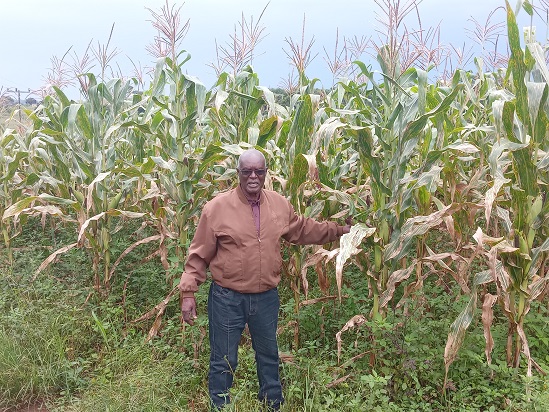

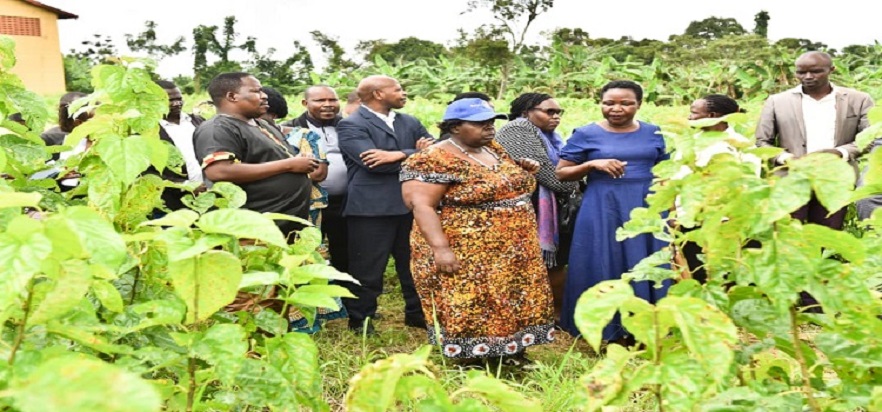

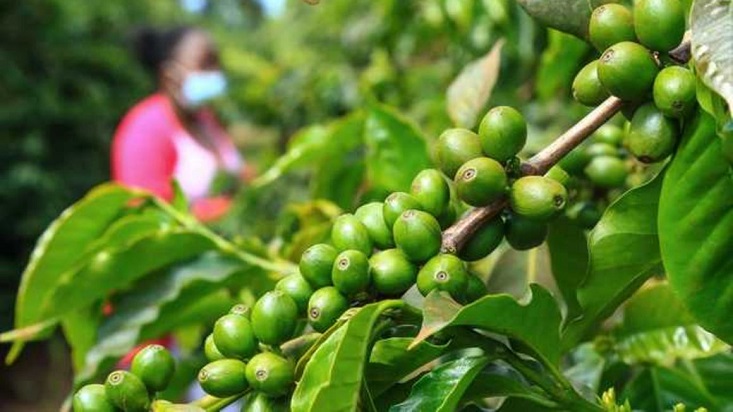
Thanks
I have loved the massage from Hon. Ssendawula, I have to move in his footsteps,now am on truck, thanks alot you who have highlighted. The hon is a great man.
I am really inspired. This is the way to go.
Great job done by Hon.Rotarian Gerald Majera Sendawula.Thanks for your exemplary work and sharing such advice to farmers and nation at large.
It is my pleasure to be here and to know more about farming
Thank you people of God
God bless you all
What an incredible expository inspirational practical educative experience shared to us farmers. Greatly appreciated Honorable Gerald Ssendawula,he is a true States Man.
Great example honorable Ssendawula and thank you for sharing your story
Oyo omusajja Kirabo kyenyini mukulima.
Again the non-aging appearance he dons is symbolic of benefits of manual physical work.
He has passion for and in his agriculture even if some activities may not seem to pay off highly he persists. We love him. I have known him for decades since I studied with his son Robert Byansi in St Henry’s College Kitovu.
Woooooooooooooow This is a good example to us farmers. We need to brainstorm and love what we are doing.
Thank you for making some us to align to farming as a business.
I am really humbled to be in this group.
I am with BSF farming and spent substrate is my organic fertilizer. I am experimented growing double garden maize in dry season by irrigation. I dug a dam. I will inform you of outcome, the positive and challenges I am to encounter. Already half acre last dry season gave courage.
I have also added free range local birds/poultry with larvae of Black Soldier Fly farming,
Results are so far encouraging.
Once again I thank you for your inspiring information.